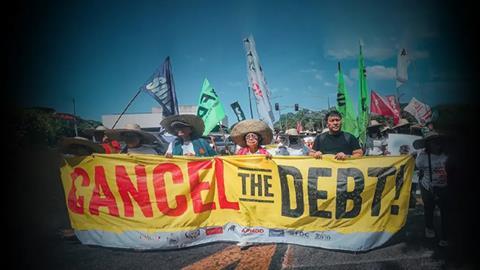National debt is often held by private lenders charging extortionate rates — draining much needed funds from schools and hospitals in the developing world. As the Jubilee Debt Commission meets today, Bishop Stephen Wright explains how the issue can be solved for good

Climate. Migration. War. Whatever the global challenge, politicians have learned over the past twelve years to expect a clarion call from Pope Francis on it.
Just weeks before his death, Francis was preparing once again to urge governments to respond to another crisis quietly devastating communities.
In February of this year, the late pontiff commissioned a group of more than 30 internationally-recognised economists and academics to produce a report into a debt crisis that dozens of countries are grappling with.
This is an economic disaster robbing children of an education, depriving families of healthcare and impeding communities from preparing for and recovering from climate catastrophes across half the world.
Today, this ‘Jubilee Debt Commission’ – which includes the Nobel Prize-winning professor Joseph Stiglitz – are presenting their report to the Vatican’s Pontifical Academy of Social Sciences. Although Pope Francis did not live to see it finished, his successor, Pope Leo, has already spoken of the “hope” that debt relief would bring.
Why does the Vatican care?
So, why is the global debt of developing countries a Vatican concern? In part, it’s because 2025 is a Jubilee year for the Catholic Church – a moment associated with forgiveness and debt relief since Old Testament times.
It’s also a reflection of the role the Vatican can play in urging governments to listen to the voices of the communities the Church serves worldwide. That includes communities in 54 countries that are spending more on interest payments than on basic public services, such as health and education.
Perhaps, like me, you’re old enough to remember the Jubilee 2000 campaign, 25 years ago, as well as ‘Make Poverty History’ – rich governments cancelled billions of dollars of debt for developing nations, and it bore great fruit, such as millions more children going to school.
The crisis now is different. Whereas the bulk of sovereign debt at the turn of the century was owed to governments or multilateral institutions, a majority of global sovereign debt now is owed to private creditors. Those creditors have often charged extortionate interest rates, forcing low- and middle-income countries to divert funds from public services to pay interest bills that exceed the amounts they originally borrowed.
This is a failure of our economic system. It’s also a moral failure.
And while politicians in the 2000s could directly ‘drop the debt’, private creditors are showing no such inclination. Instead, they are continuing to demand payments even when this would deprive a country of the money they need to pay teachers or healthcare workers. Further, private creditors face no compulsion to engage in debt restructuring talks, even if a majority of other creditors are prepared to come to the negotiating table.
The UK’s quiet power
This is a failure of our economic system. It’s also a moral failure.
And it doesn’t need to be, because it’s one that our leaders can play an oversized role in resolving.
More than 90 per cent of debt contracts operate under English law. This means the UK government has the power to pass a law preventing private creditors from suing countries in debt distress, demanding payments that would push their people into poverty. It also has the power to force private creditors to the negotiating table when a majority of other creditors are ready to enter talks.
To solve an urgent crisis, at no-cost to taxpayers? That has to be worth doing – right away.
The Prime Minister and the Chancellor have declared it their mission to increase prosperity and security. The Vatican is pointing a way to deliver this mission to the whole world. But unless and until politicians act, the debt crisis plaguing nearly half the world’s population will continue to condemn dozens of countries, including potential UK trading partners, to the vicious cycle of poverty and insecurity.
Even after his death, our leaders would do well to follow the path Pope Francis and those before him set out.



































No comments yet